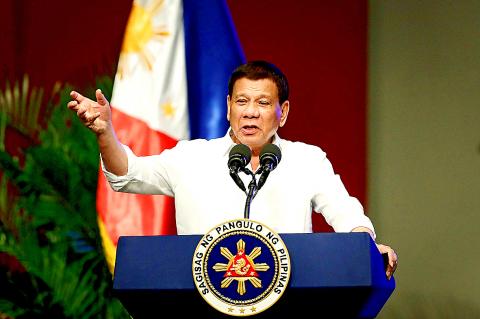The Taiwan-based Bamboo Union and Hong Kong-based 14K triad are behind the proliferation of drugs in the Philippines, Philippine President Rodrigo Duterte said yesterday, after barrels of drugs fitted with satellite positioning equipment and covered with Chinese writing washed up in the Philippines on Wednesday last week.
He first made the allegation that the drugs were from Taiwan while speaking at a police academy alumni event on Thursday last week.
Duterte, speaking on Tuesday at an event marking the 120th anniversary of the establishment of the Philippine Department of Justice, named the Bamboo Union and 14K as running the drug trade in the country.

Photo: EPA
At an event celebrating the 56th anniversary of the Philippine Constitution Association, he said that the Philippines is a client state of the Bamboo Union.
“The Philippines is a transshipment [point] of shabu to America. It behooves upon America to work closely with the Republic of the Philippines, especially in this serious matter,” he said.
Shabu is a slang term for methamphetamine that is widely used in the Philippines, Japan, Hong Kong, Malaysia and Indonesia.
Illegal drugs have penetrated 40 percent of the villages in the country, Duterte said.
He has been pushing to postpone village elections scheduled for next month, citing the alleged presence of narcotics in politics at the village level.
Duterte, who is known for his controversial policy of cracking down on drugs by sanctioning extrajudicial killings of suspected drug dealers, on Thursday last week reportedly gave police orders to kill his eldest son if they discover that he is involved in the drug trade.
That remark came after Philippine Senator Antonio Trillanes claimed that Duterte’s eldest son is a member of a Chinese drug triad.
Meanwhile, a Ministry of Foreign Affairs spokeswoman yesterday reiterated Taiwan’s support of the Philippine government’s “war on drugs.”
Regarding Duterte’s claim that the Bamboo Union, a known organized crime group, is one of the primary sources of drugs in the Philippines, ministry spokeswoman Eleanor Wang (王珮玲) said in a statement that the government would work with relevant Philippine agencies to eliminate cross-border drug-related crime.
A critical component of the administration’s New Southbound Policy is to strengthen Taiwan’s collaboration with other nations to crack down on international crime, which in the case of the Philippines means a shared effort to combat drug-related crime, Wang said.
The statement did not dispute Duterte’s allegations, but voiced support for his increasingly tough policies on drug-related activities.
The Taipei Economic and Cultural Office in the Philippines yesterday rejected Duterte’s claims.
Representative to the Philippines Gary Lin (林松煥) said that what is known at the moment is that illegal drugs in the Philippines are not coming from Taiwan.
Taiwan does not ship drugs to the Philippines, Lin said, but added that his office was looking into the situation.
Regarding an allegation that drugs were being produced in labs in international waters, Lin said that Taiwanese fishing boats were not involved and that the transportation routes were most likely in international waters.
Raw materials for the production of illegal drugs have been mainly obtained from China, while Taiwanese have provided expertise, said a Philippine source, who claimed to be an expert on the Philippine drug trade.

An essay competition jointly organized by a local writing society and a publisher affiliated with the Chinese Communist Party (CCP) might have contravened the Act Governing Relations Between the People of the Taiwan Area and the Mainland Area (臺灣地區與大陸地區人民關係條例), the Mainland Affairs Council (MAC) said on Thursday. “In this case, the partner organization is clearly an agency under the CCP’s Fujian Provincial Committee,” MAC Deputy Minister and spokesperson Liang Wen-chieh (梁文傑) said at a news briefing in Taipei. “It also involves bringing Taiwanese students to China with all-expenses-paid arrangements to attend award ceremonies and camps,” Liang said. Those two “characteristics” are typically sufficient

A magnitude 5.9 earthquake that struck about 33km off the coast of Hualien City was the "main shock" in a series of quakes in the area, with aftershocks expected over the next three days, the Central Weather Administration (CWA) said yesterday. Prior to the magnitude 5.9 quake shaking most of Taiwan at 6:53pm yesterday, six other earthquakes stronger than a magnitude of 4, starting with a magnitude 5.5 quake at 6:09pm, occurred in the area. CWA Seismological Center Director Wu Chien-fu (吳健富) confirmed that the quakes were all part of the same series and that the magnitude 5.5 temblor was

The brilliant blue waters, thick foliage and bucolic atmosphere on this seemingly idyllic archipelago deep in the Pacific Ocean belie the key role it now plays in a titanic geopolitical struggle. Palau is again on the front line as China, and the US and its allies prepare their forces in an intensifying contest for control over the Asia-Pacific region. The democratic nation of just 17,000 people hosts US-controlled airstrips and soon-to-be-completed radar installations that the US military describes as “critical” to monitoring vast swathes of water and airspace. It is also a key piece of the second island chain, a string of

The Central Weather Administration has issued a heat alert for southeastern Taiwan, warning of temperatures as high as 36°C today, while alerting some coastal areas of strong winds later in the day. Kaohsiung’s Neimen District (內門) and Pingtung County’s Neipu Township (內埔) are under an orange heat alert, which warns of temperatures as high as 36°C for three consecutive days, the CWA said, citing southwest winds. The heat would also extend to Tainan’s Nansi (楠西) and Yujing (玉井) districts, as well as Pingtung’s Gaoshu (高樹), Yanpu (鹽埔) and Majia (瑪家) townships, it said, forecasting highs of up to 36°C in those areas